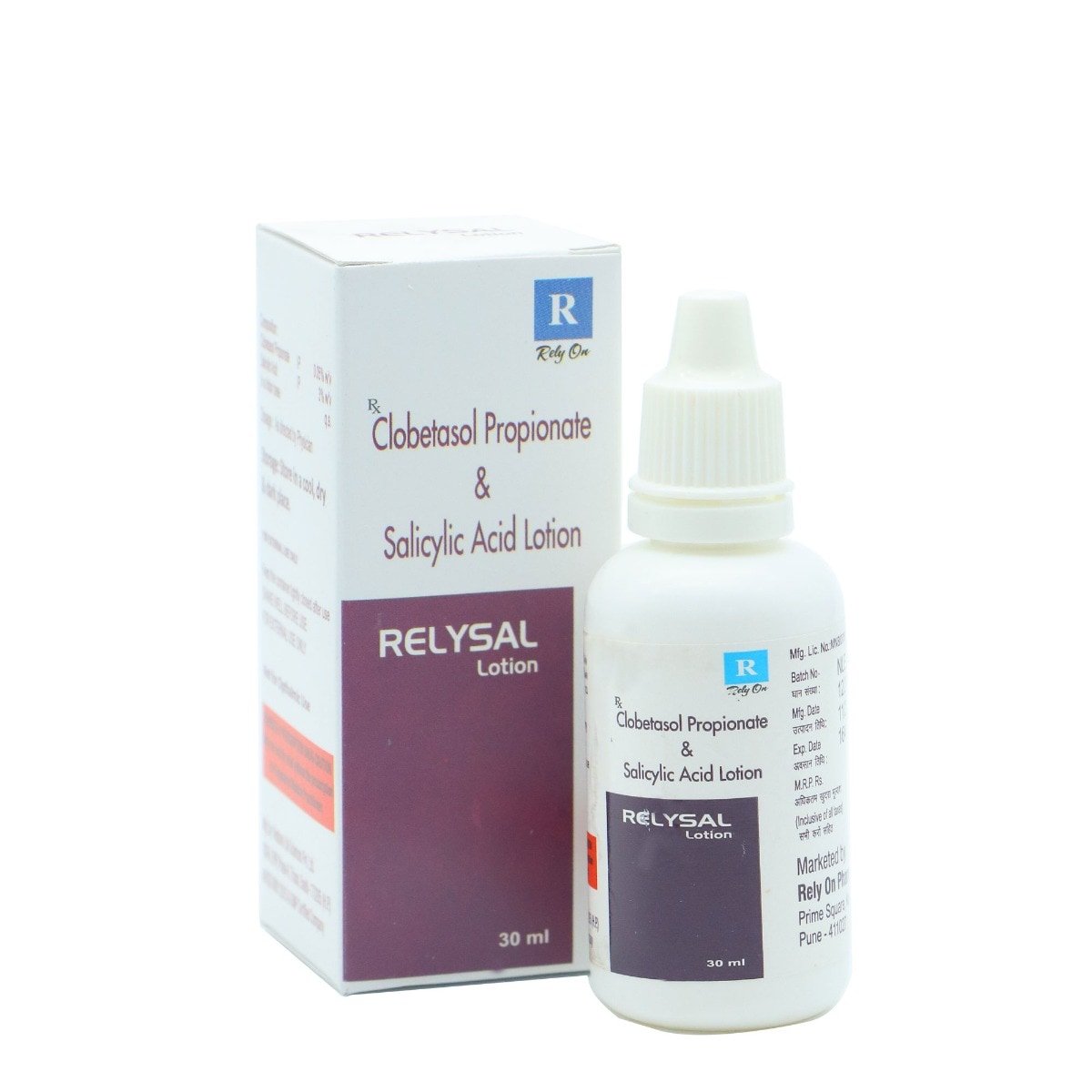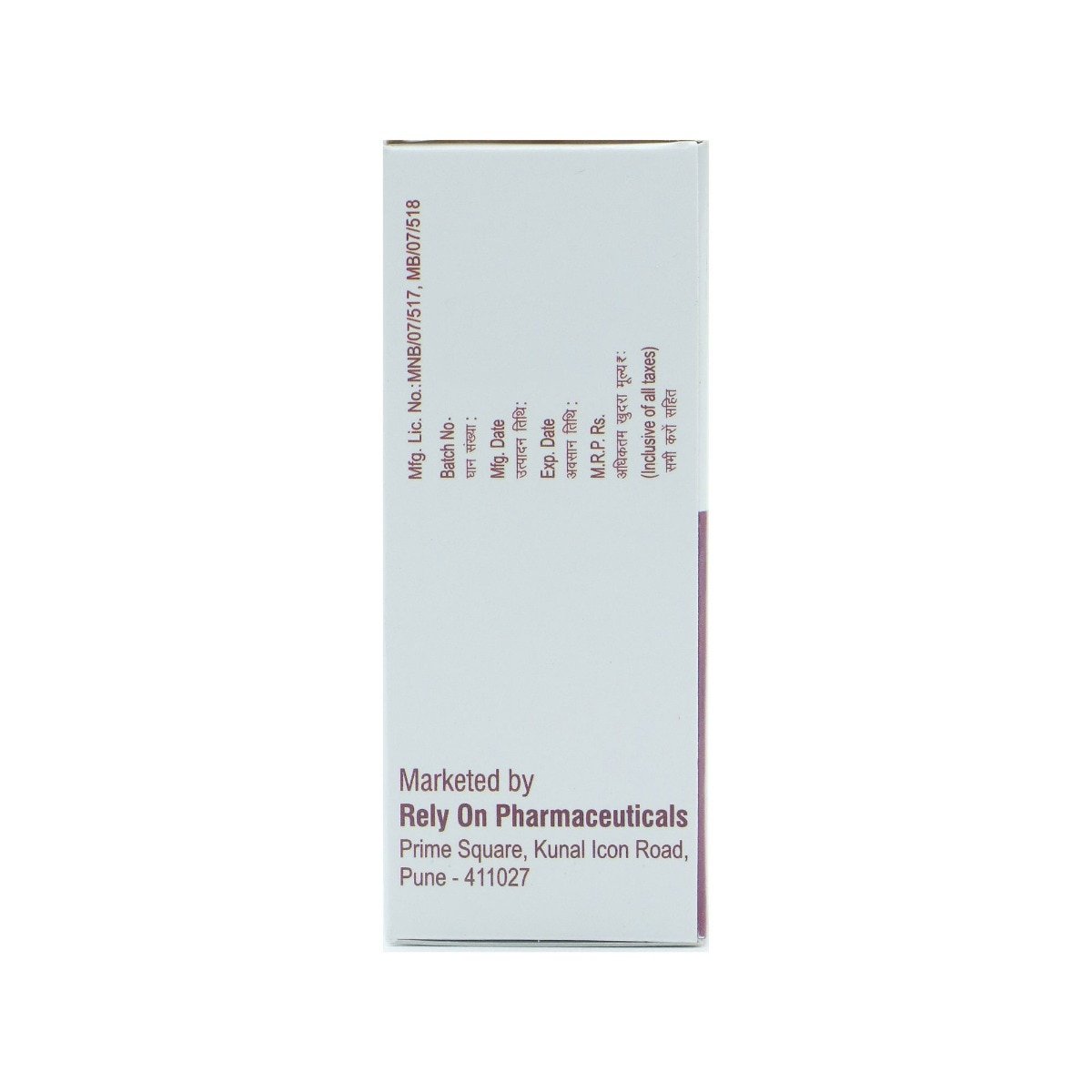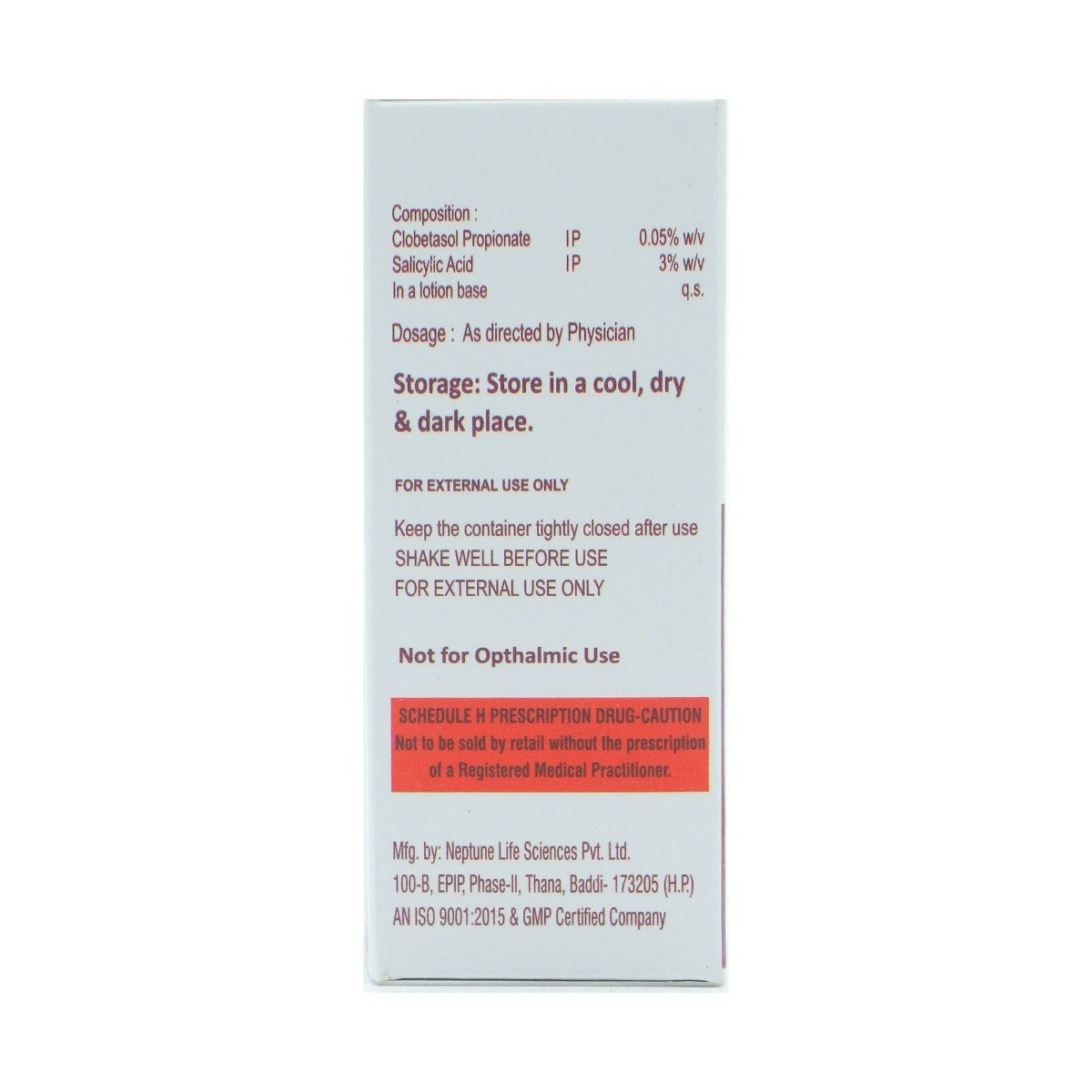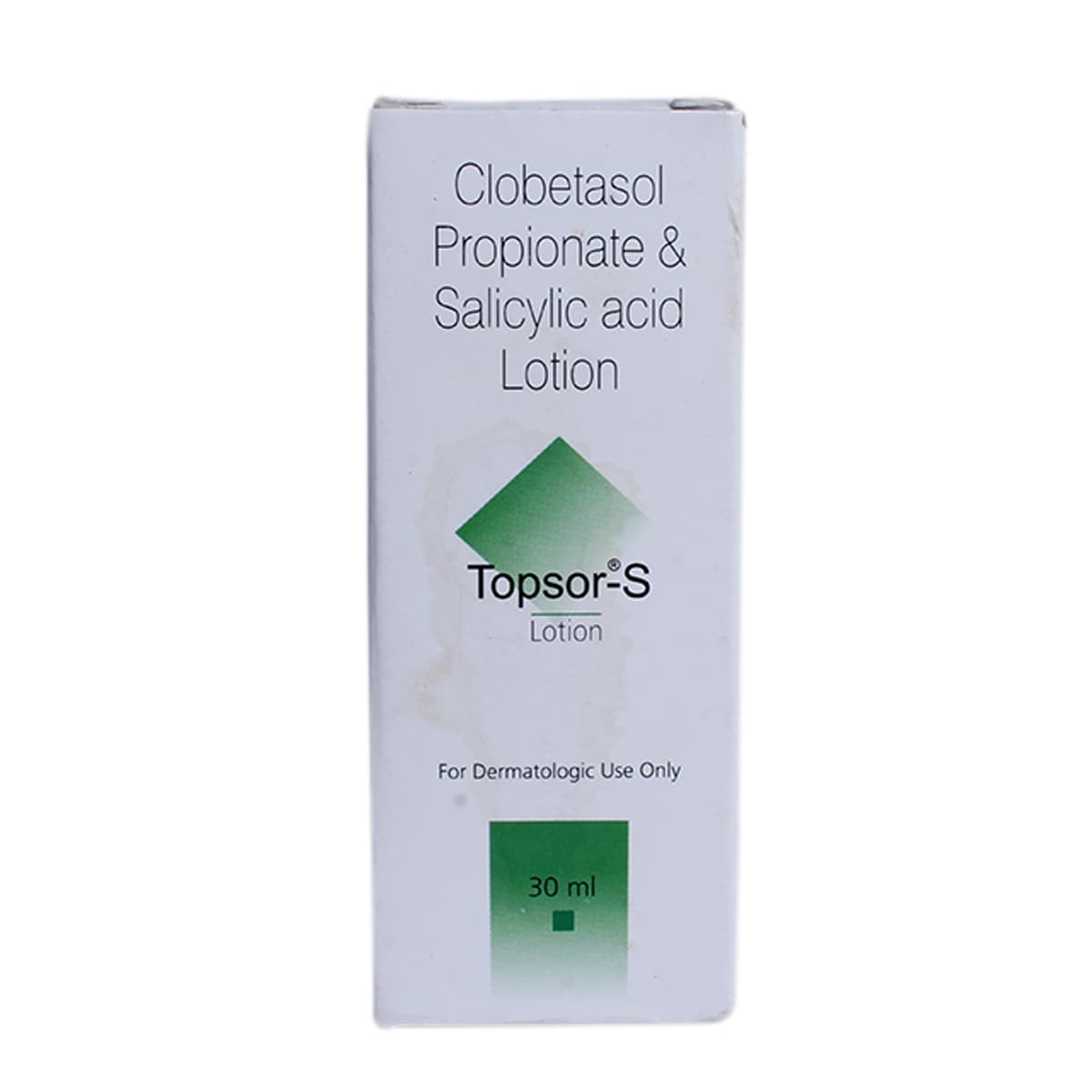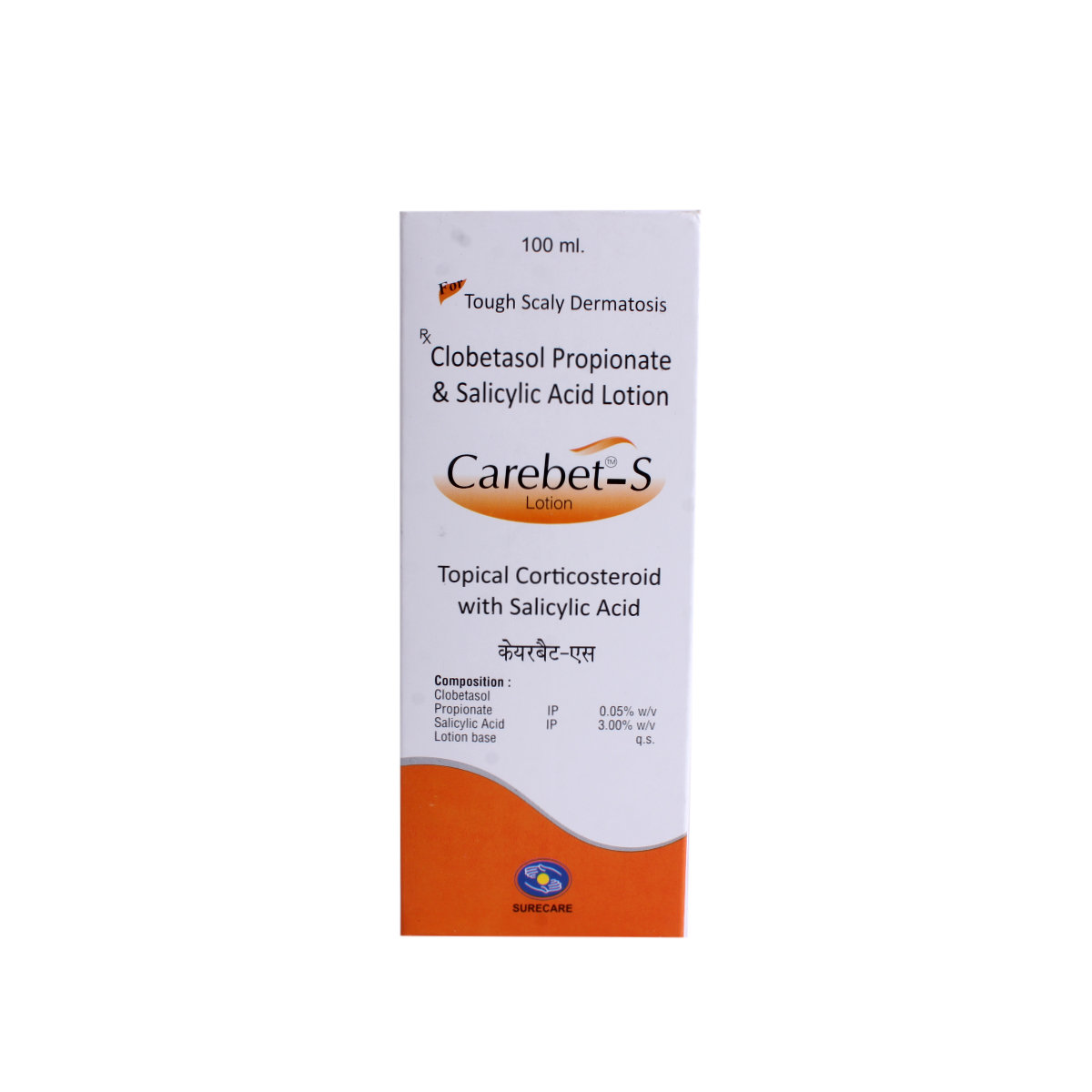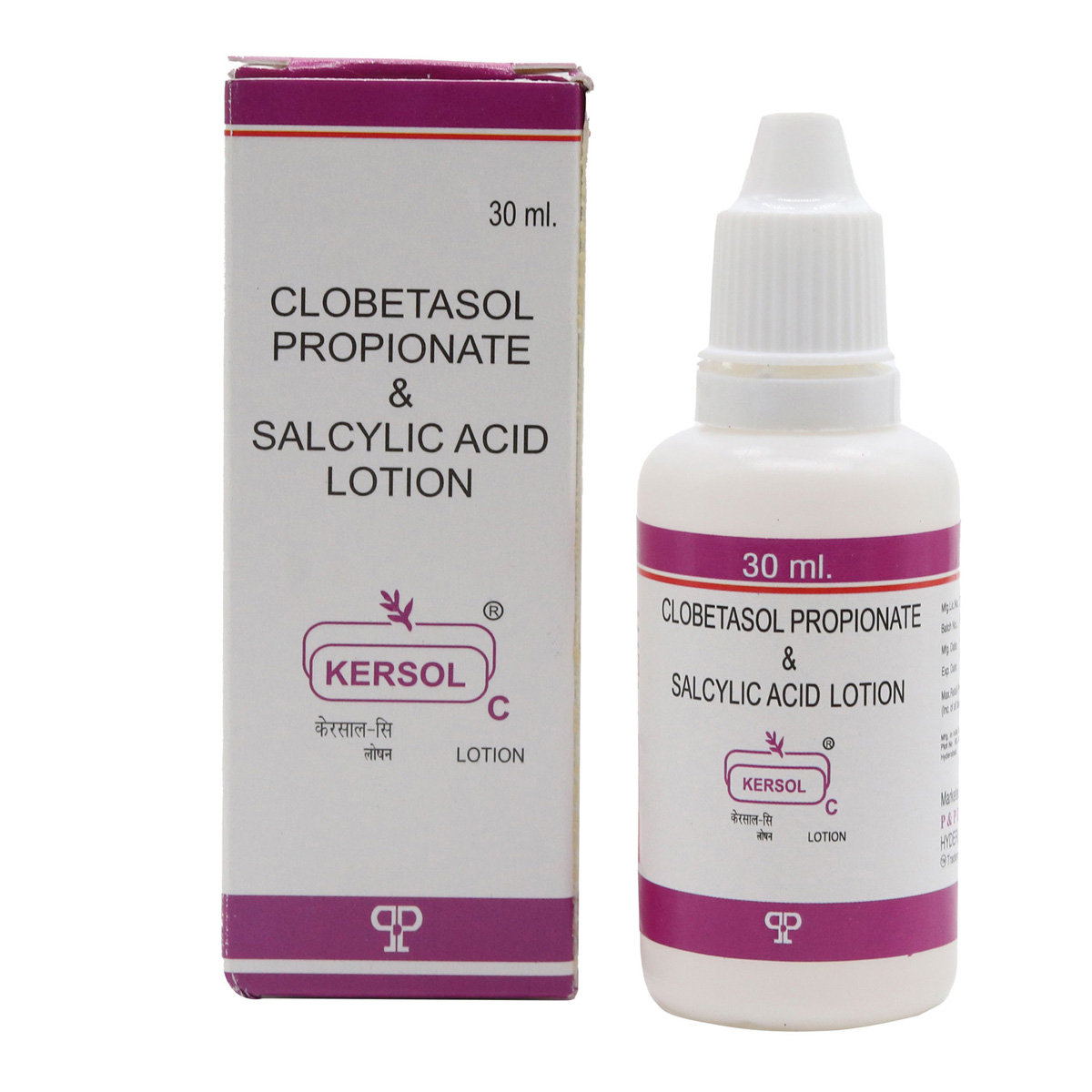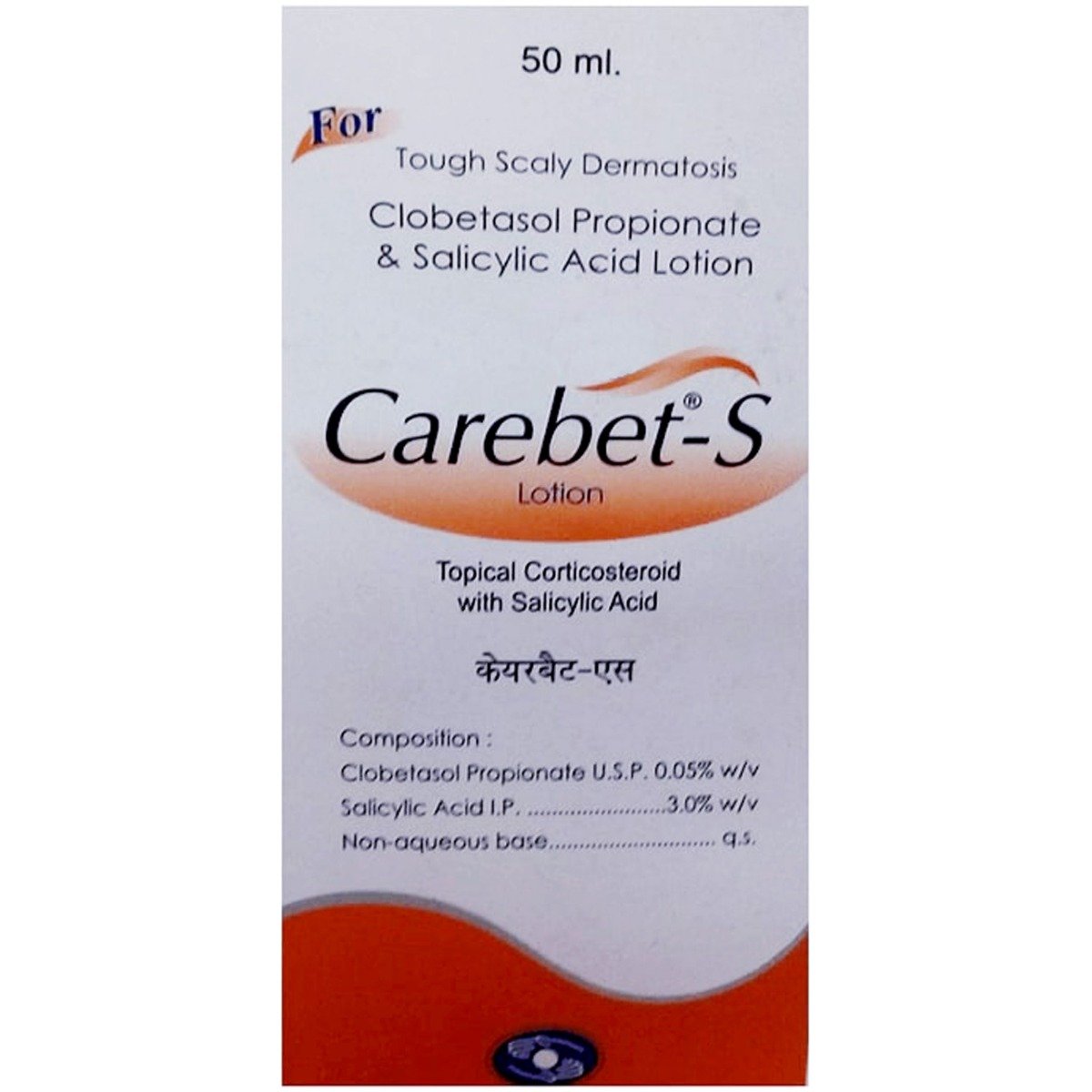Relysal Lotion 30 ml
MRP ₹187.5
(Inclusive of all Taxes)
₹28.1 Cashback (15%)
Provide Delivery Location
Online payment accepted
 Prescription drug
Prescription drugWhats That
Composition :
Manufacturer/Marketer :
Consume Type :
Expires on or after :
Return Policy :
About Relysal Lotion
Relysal Lotion is a combination of two medicines that are primarily used to treat eczema and psoriasis. Eczema is a condition in which skin patches become inflamed, itchy, cracked, and rough. Some types of eczema can also lead to blisters (a small bubble on the skin that is filled with serum and is caused by friction, burning, or other damage). Psoriasis is a skin disorder in which skin cells multiply up to 10 times faster than normal which leads to the build-up of skin into bumpy (uneven) red patches covered with white scales. These can grow anywhere, but most commonly they appear on the scalp, elbows, knees and lower back.
Relysal Lotion comprises clobetasol and salicylic acid. Clobetasol is a steroid that works by blocking the production of certain chemical messengers (prostaglandins) that are responsible for making the skin red, swollen, and itchy. Salicylic Acid is a keratolytic medicine (that softens, separates, and causes desquamation (peeling) of the cornified epithelium or horny layer of skin) which breaks down the clumps of keratin, removes dead skin cells, and helps in softening of the skin. It also helps in the absorption of Clobetasol into the skin.
Relysal Lotion should be used in the dose and duration as advised by the doctor. It is advised to check the label for directions before use. It is for external use only. Make sure to wash your hands before and after using this medicine. Relysal Lotion is generally safe to use. Some may experience side effects such as peeling of the skin, thinning of the skin, burning, itching, irritation, and redness at the application site. Please consult your doctor if you experience a worsening of any side effect.
Do not stop using Relysal Lotion without consulting your doctor. Please inform your doctor if you are pregnant or are suffering from any other disease. Relysal Lotion is safe to use in breastfeeding mothers. Inform your doctor if you are allergic to Relysal Lotion.
Uses of Relysal Lotion
Directions for Use
Key Benefits
When you take Relysal Lotion, it works by blocking the production of certain chemical messengers (prostaglandins) that are responsible for making the skin red, swollen, and itchy. It softens, separates, and causes desquamation of the cornified epithelium or horny layer of skin and breaks down the clumps of keratin, removes dead skin cells and helps in the softening of the skin.
Storage
- Shield your skin from the sun by using sunscreen, seeking shade, and wearing protective clothing.
- Please don't smoke, as it damages the skin and reduces blood flow.
- Treat your skin gently by limiting bath time, using mild cleansers, and shaving carefully.
- Eat a healthy diet of fruits, vegetables, whole grains, and lean proteins.
- Stay hydrated by drinking plenty of water.
- Manage stress through sleep, exercise, meditation, and enjoyable activities.
- Additionally, use moisturizers to coat your skin with a protective barrier, and consider wearing sun-protective clothing.
- Apply moisturizer immediately after showering or bathing.
- Use a moisturizer containing lanolin, petroleum jelly, glycerine, hyaluronic acid or jojoba oil.
- Do not use hot water for bathing. Instead use warm water and limit showers and bath to 5 to 10 minutes.
- Apply a sunscreen with SPF-30 or higher.
- Avoid harsh soaps, detergents and perfumes.
- Do not scratch or rub the skin.
- Drink adequate water to prevent dehydration.
- Wear pants, full sleeves and a wide-brimmed hat while going out in the sun.
- Burning sensation is an abnormal side effect that needs medical attention. To relieve the burning feeling, your doctor may prescribe painkillers or antidepressants.
- Focused exercises can improve strength and reduce burning by soothing muscles.
- Change in lifestyle and improving nutrition can reduce the causes of burning sensation and provide relief.
- Your doctor may suggest nerve block injections as it is related to sensation in the skin.
- Burning feeling in a specific area would need mild electrical currents to reduce pain that targets the nerve affected. This practice must be done only if your doctor mentions it.
- Change positions or take a break from activity to relieve symptoms, as stinging can disturb your regular patterns.
- Avoid postures that put much pressure on the body area where stinging is felt.
- If you have a vitamin deficiency, take supplements or change your diet.
- Exercise regularly to improve inner strength.
- Follow your doctor's instructions to prevent stinging.
- Massage the affected area gently to get temporary relief.
- Mild hair follicle inflammation often heals on its own without needing treatment.
- You can apply a warm saltwater or vinegar solution to the affected area with a washcloth, or use over-the-counter antibiotics, oatmeal lotion, or hydrocortisone cream for relief.
- Avoid making the affected area worse by not shaving, scratching, or wearing tight clothes.
- Apply a warm compress to the area 3-4 times a day for 15-20 minutes to help speed up healing.
- Do not scratch, squeeze, or pop any bumps, as this may lead to infection or other problems.
- If self-care methods fail, consult a doctor for further treatment and advice.
Drug Warnings
Relysal Lotion should be used with caution for a long time as long-term usage can pose the risk of adrenal gland problems. It is advised to discontinue this medicine if you experience symptoms like blurred vision, dizziness or fainting, a fast, irregular, or pounding heartbeat, increased thirst or urination, irritability, or unusual tiredness or weakness.
Drug-Drug Interactions
Drug-Drug Interactions
Login/Sign Up
Drug-Food Interactions
Drug-Food Interactions
Login/Sign Up
Diet & Lifestyle Advise
- Use mild soap while taking baths and prefer warm baths.
- Avoid harsh products on your skin.
- Do not scratch or pick your skin to avoid getting the affected area infected.
- Manage stress, eat healthily, drink plenty of water, exercise regularly, and get plenty of sleep.
Side Effects of Relysal Lotion
- Peeling of the skin
- Thinning of the skin
- Burning, itching, irritation, and redness at the application site
Habit Forming
Therapeutic Class
All Substitutes & Brand Comparisons
RX
Out of StockClosylic Lotion 50 ml
Human Biologicals Institute
₹98
(₹1.76/ 1ml)
68% CHEAPERRX
Betasalic S Lotion 30 ml
Omega Pharmaceuticals Pvt Ltd
₹84
(₹2.52/ 1ml)
55% CHEAPERRX
Out of StockZebet-S Lotion
₹90
(₹2.7/ 1ml)
52% CHEAPER
Drug-Diseases Interactions
Drug-Diseases Interactions
Login/Sign Up
FAQs
Yes, Relysal Lotion should not be used on the face. It is advised not to use this medicine for more than the recommended duration to avoid unpleasant side-effects. Avoid applying a bandage or dressing to the affected area.
No, it is not advised to use Relysal Lotion in more than the recommended dose as using the medicine in more than the prescribed quantity can lead to its excessive absorption into the body. It may also cause thinning or weakening or peeling of the skin.
No, it is not advised to stop using Relysal Lotion even after your symptoms are relieved. You should complete the full course of treatment. You might see improvement in your symptoms but the disease might not be cured completely.
It is advised to keep this medicine in the container or the pack it came in and keep it tightly closed. Store it as per the instructions mentioned on the pack or label. Dispose of the medicine which is unused. Keep away from pets, children, and other people.
Relysal Lotion should be used according to the directions given by the doctor. Read the label before use. The medicine should be applied in sufficient quantity to cover the affected areas. It is usually applied two or three times a day to the affected areas. Make sure to wash your hands before and after using Relysal Lotion.
No, Relysal Lotion cannot be used for a long time as it can cause skin atrophy.
No, Relysal Lotion cannot be used for bacterial infections.
Drug-Drug Interactions Checker List
- RITONAVIR
- ITRACONAZOLE
- ASPIRIN
- CYMBALTA
Special Advise
Relysal Lotion is not advised to use with other topical corticosteroid-containing medicines, such as betamethasone, hydrocortisone, or triamcinolone as it may lead to unpleasant side effects. It is not advised to use cosmetic products in the affected area. Inform your doctor if you are taking aspirin.
Disease/Condition Glossary
Eczema: It is a condition in which skin patches become inflamed, itchy, cracked, and rough. Some types of eczema can also lead to blisters (a small bubble on the skin that is filled with serum and is caused by friction, burning, or other damage).
Psoriasis: It is a skin disorder in which skin cells multiply up to 10 times faster than normal which leads to the buildup of skin into bumpy (uneven) red patches covered with white scales. These can grow anywhere, but most commonly they appear on the scalp, elbows, knees, and lower back.

Have a query?
Alcohol
Safe if prescribed
No interaction found of Relysal Lotion with alcohol.
Pregnancy
Consult your doctor
Not enough scientific data available for Relysal Lotion, hence it is best to consult a doctor. Your doctor will weigh the benefits and any potential risks before prescribing it to you.
Breast Feeding
Consult your doctor
Not enough scientific data available for Relysal Lotion, hence it is best to consult a doctor. Your doctor will weigh the benefits and any potential risks before prescribing it to you.
Driving
Safe if prescribed
There have been no studies to investigate the effect of Relysal Lotion on driving performance or the ability to operate machinery. Drive only if you are physically stable and mentally focussed, If you experience drowsiness after taking these medications you should not drive or operate any machinery or vehicles.
Liver
Consult your doctor
No interaction of Relysal Lotion found with the liver.
Kidney
Consult your doctor
No interaction of Relysal Lotion found with kidney.
Children
Safe if prescribed
Your doctor will weigh the benefits and any potential risks before prescribing it to you. Please consult your doctor.

